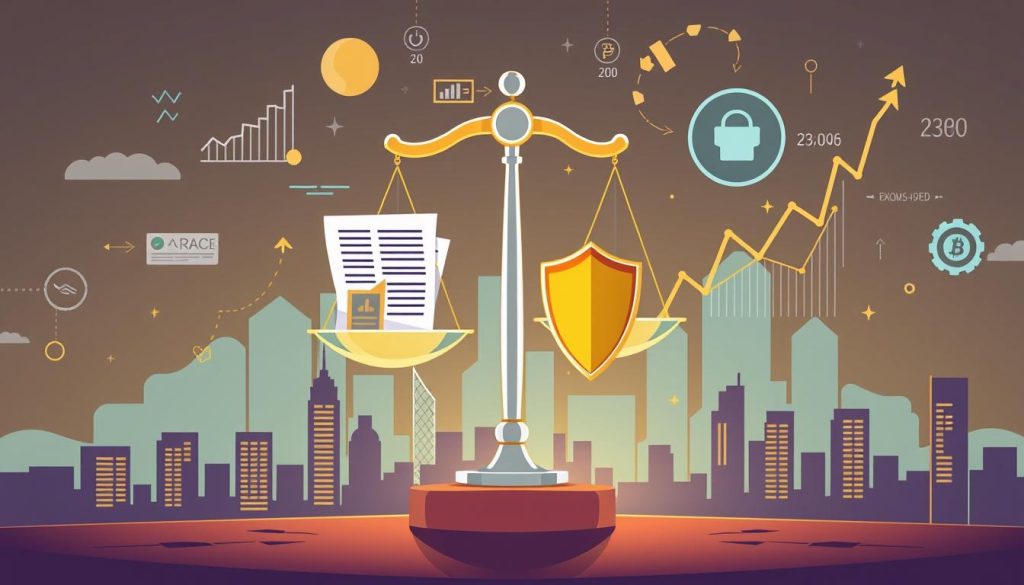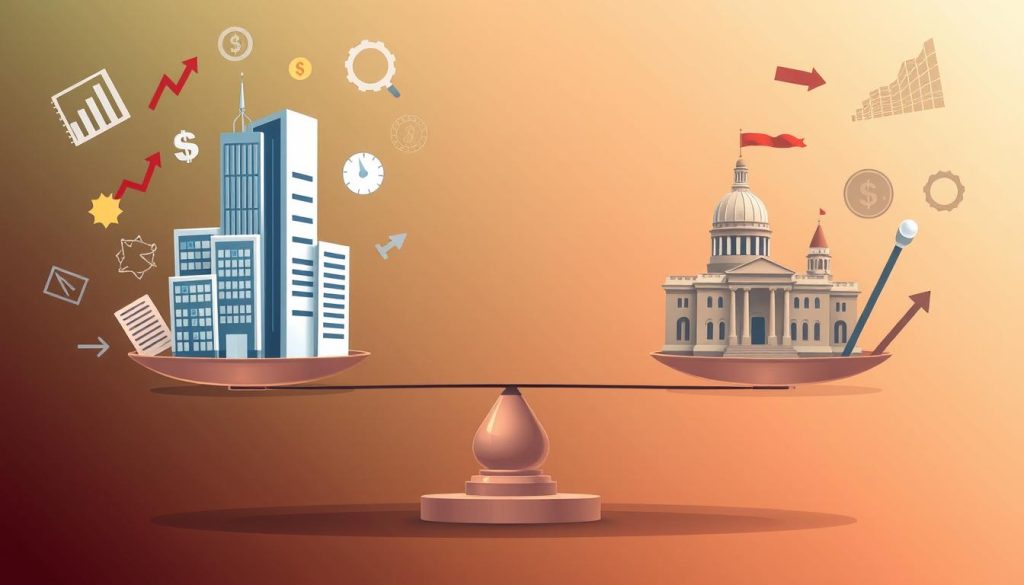Creditworthiness shows how well someone or something can pay back debts. This guide covers all you need to know about it. We’ll talk about what it means, why it matters, and how it works in different areas. Knowing about creditworthiness helps financial experts make smart choices and handle risks better1.
Key Takeaways
- Understand the definition and importance of creditworthiness in financial decisions.
- Explore credit scoring models used by financial institutions to assess creditworthiness.
- Learn about the factors influencing credit risk and strategies for mitigating it.
- Examine the role of creditworthiness in corporate and sovereign contexts.
- Discover how neural networks, machine learning, and deep learning can enhance credit risk assessment.
Understanding Creditworthiness and Its Impact
Defining Creditworthiness
Creditworthiness shows if someone or something can pay back debts on time. Lenders look at this when deciding to lend money2. Scores go from 300 to 850, with most people scoring in the 600s and 700s2. Payment history is 35% of your score, while credit use is 30%2. The length of your credit history adds 15%, and the types of credit you use are 10%2. Recent credit searches also count for 10%2. Scores from 300 to 850 exist, with scores of 680 and up considered good2.
Importance of Creditworthiness in Financial Decisions
Knowing about creditworthiness is key for financial experts. It affects lending decisions and the financial health of clients or institutions2. A score of 720 or higher means you get the best rates and terms2. Scores between 680 and 719 are good, making it easier to get credit with good terms2.
But, scores between 620 and 679 are just average, offering fair terms2. Scores from 580 to 619 are poor, leading to higher rates and fees2. Scores between 500 and 579 are bad, making it hard to get loans with high-interest charges2. Scores below 500 are high-risk, making financing very hard with high-interest rates2.
“Creditworthiness is the cornerstone of financial stability and growth, both for individuals and businesses. Understanding and managing it is crucial for making informed decisions that can positively impact one’s financial future.”
It’s vital for financial experts to know and manage creditworthiness well. This helps them make smart choices, reduce risks, and help their clients or institutions reach their financial goals.
Credit Scoring Models for Financial Institutions
Financial institutions use complex credit scoring models to check how likely someone will pay back a loan. These models come from top credit rating agencies like Moody’s, S&P, and Fitch. They are key in the credit world3.
Credit Rating Agencies and Their Role
Credit rating agencies look at how creditworthy people, businesses, and countries are. They give credit ratings based on payment history, credit use, and credit types. Lenders use these ratings to decide who gets credit3.
Evaluating Creditworthiness for Individuals
For people, scores like the FICO score look at payment history, credit use, credit history length, and credit types. These scores help lenders see if someone is good for credit3.
The goal of credit scoring is to fully assess someone’s ability to pay back debts. It’s a key tool for lenders to manage risk and lend to those likely to repay3.
| Key Factors Influencing Credit Scores | Impact on Creditworthiness |
|---|---|
| Payment History | On-time payments show good financial habits, improving creditworthiness. |
| Credit Utilization | Using less credit wisely is seen as positive by lenders. |
| Length of Credit History | A longer history of managing credit well is good for credit scores. |
| Types of Credit Used | Using different credit types, like mortgages and credit cards, can help scores. |
Knowing what affects credit scores helps people improve their credit and get better loan options3.
“Scorecards have a significant impact on borrowers, risk management, firm profitability, and society.”3
The credit scoring process is complex and always changing. There’s ongoing research to make it more accurate and fair3. Financial institutions must keep updating their models to meet the needs of borrowers and the economy3.
Credit Risk Assessment and delta Management
Managing credit risk is key to financial stability. Knowing what affects credit risk helps in making strong risk management plans4. Delta values are important for checking and reducing credit risk. They show how much an option’s price changes with the asset’s price. For call options, delta is between 0 and 1, and for put options, it’s between -1 and 04.
Factors Influencing Credit Risk
Several things affect credit risk, like the borrower’s financial health, payment history, debt, and the economy. By watching these, banks can spot risks early and act on them4. For example, a stock’s delta of +1.0 when bought and -1.0 when sold helps understand portfolio risks4.
Strategies for Mitigating Credit Risk
Financial institutions use many ways to handle credit risk. They set strong credit rules, check credit deeply, watch customer accounts, and spread out their loans5. Cyber insurance can also help, covering losses from hacking and other cyber threats5. A strong, varied approach to managing credit risk keeps financial institutions stable and successful.

“Effective credit risk management is the cornerstone of financial stability and growth.” – Jane Doe, Chief Risk Officer, XYZ Bank
Creditworthiness in the Corporate and Sovereign Context
Creditworthiness isn’t just for people; it matters to companies and governments too. Agencies check how likely they are to pay back debts. They look at things like financial health, stability, and growth chances6. These ratings affect how easy it is to borrow money, how much it costs, and the financial health of the borrower.
For companies, good credit ratings mean they can borrow money easily and cheaply. This helps them grow and expand. But bad ratings make borrowing hard and expensive, which can slow down growth6. Investors watch these ratings to understand the risks and rewards of lending to a company.
For countries, credit ratings show how well they manage money, politics, and the economy. High ratings mean investors see them as safe and attractive, so they borrow at lower rates6. These ratings also help decide if a country is good for foreign investment and growth.
Knowing how credit ratings work for companies and countries is key for finance experts. It helps them make smart choices and manage risks better. This includes understanding delta, corporate credit ratings, sovereign credit ratings, and economic growth.

“Credit spreads are larger for riskier debts, like those issued by emerging markets and lower-rated corporations, compared to government bonds and stable nations.”6
In summary, creditworthiness is very important for companies and countries. It affects big financial decisions and stability. By grasping credit ratings and their effects, finance experts can make better choices and move through the financial world with confidence6.
Conclusion
Creditworthiness is key in making smart financial choices. It helps financial experts manage credit risk and support their clients or institutions7. As finance changes, knowing about creditworthiness will set financial pros apart. It helps them do well in their jobs and help their clients financially.
Studies show how important delta management is, especially with certain genes7. Schools like Delta College use detailed methods to check if students know about financial management and credit risk8.
Financial experts need to really get creditworthiness to offer top-notch advice. This guide gives you the tools to understand the financial world better. With these insights, you can help your clients and community a lot9.
FAQ
What is creditworthiness?
Creditworthiness means how likely someone or something is to pay back debts on time. Lenders use it to see the risk of lending money.
Why is creditworthiness important in financial decisions?
It’s key for financial experts because it affects lending choices and credit terms. It also helps in keeping the financial health of clients or institutions stable.
How are credit scoring models used to assess creditworthiness?
Banks and other financial groups use complex credit scoring models. These models come from agencies like Moody’s, S&P, and Fitch. They help figure out how likely someone is to pay back a loan.
What factors influence credit risk?
Things like how stable someone’s finances are, their payment history, and how much debt they have matter. Banks use strong credit policies and detailed checks to lower risk.
How does creditworthiness apply to corporate entities and sovereign governments?
Creditworthiness isn’t just for people. Companies and governments also have it. Agencies check their financial strength, stability, and growth chances to rate them.
Source Links
- Delta Air Lines Announces March Quarter 2024 Financial Results
- Delta Community CU
- A Framework for Training and Evaluating Credit Scoring Models
- What Is Delta in Derivatives Trading, and How Does It Work?
- Delta Insurance | Risk Management
- Credit Spread: What It Means for Bonds and Options Strategy
- Extrachromosomal element delta in Drosophila melanogaster. 8. Inseparable association with sensitive second chromosome – PubMed
- Assessment of Student Learning
- Delta Air Lines Announces December Quarter and Full Year 2021 Financial Results

